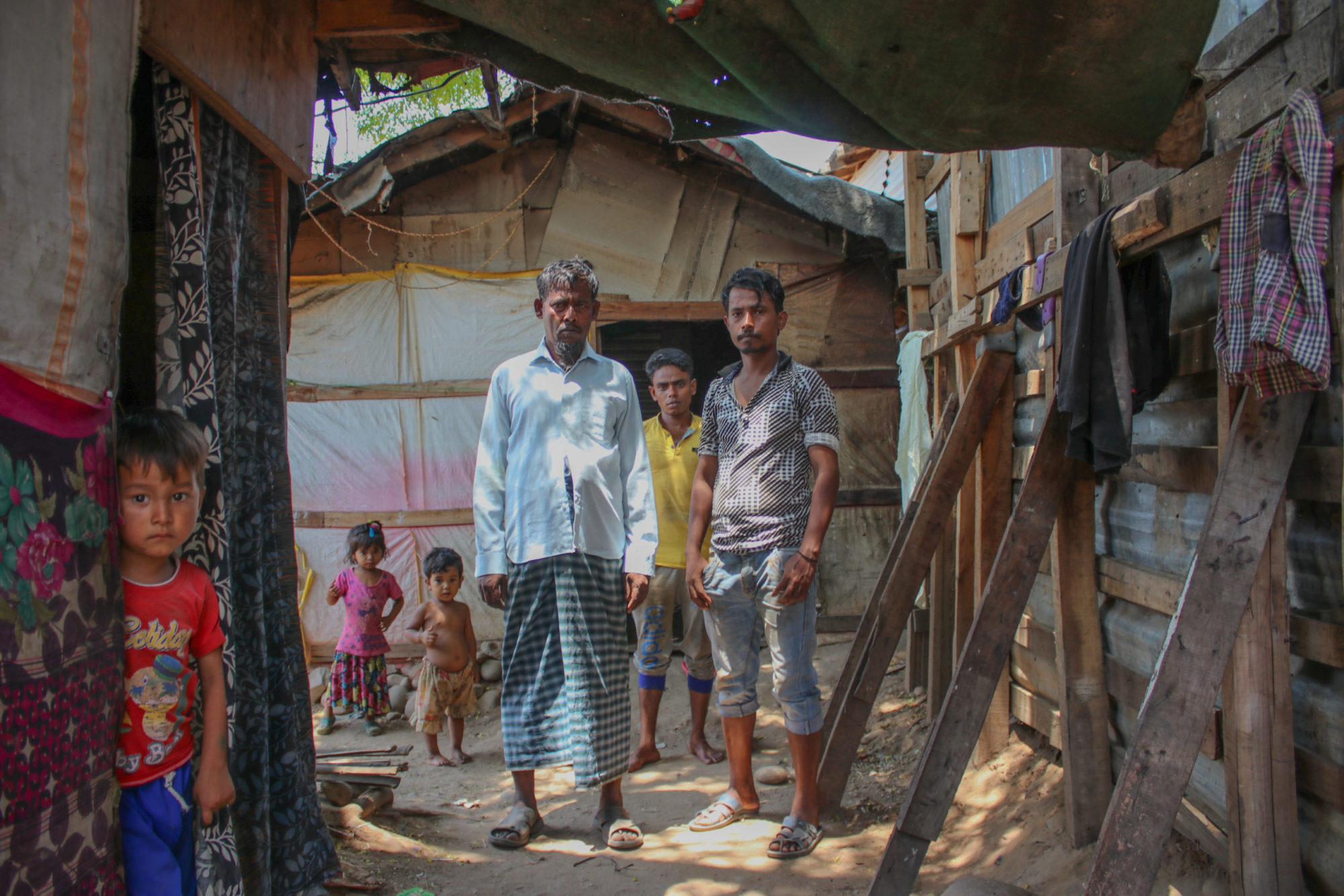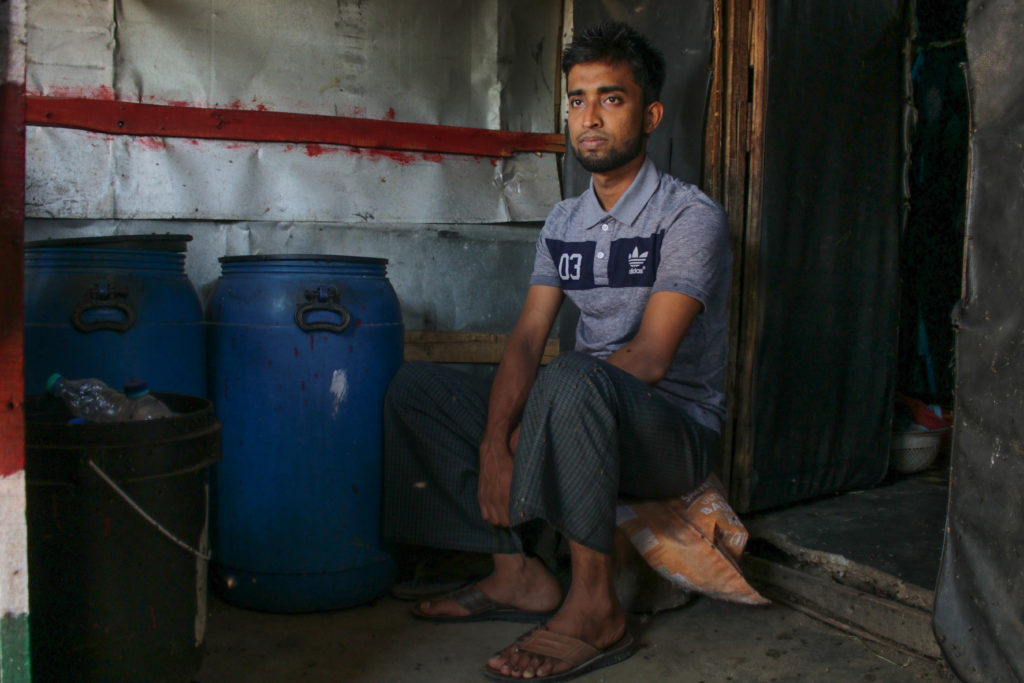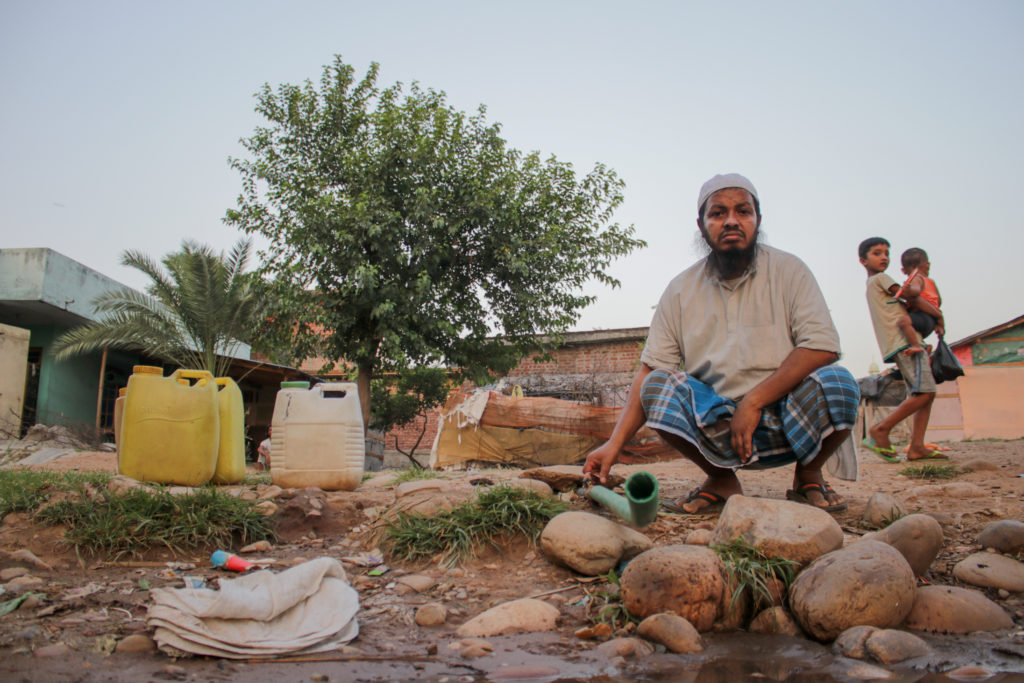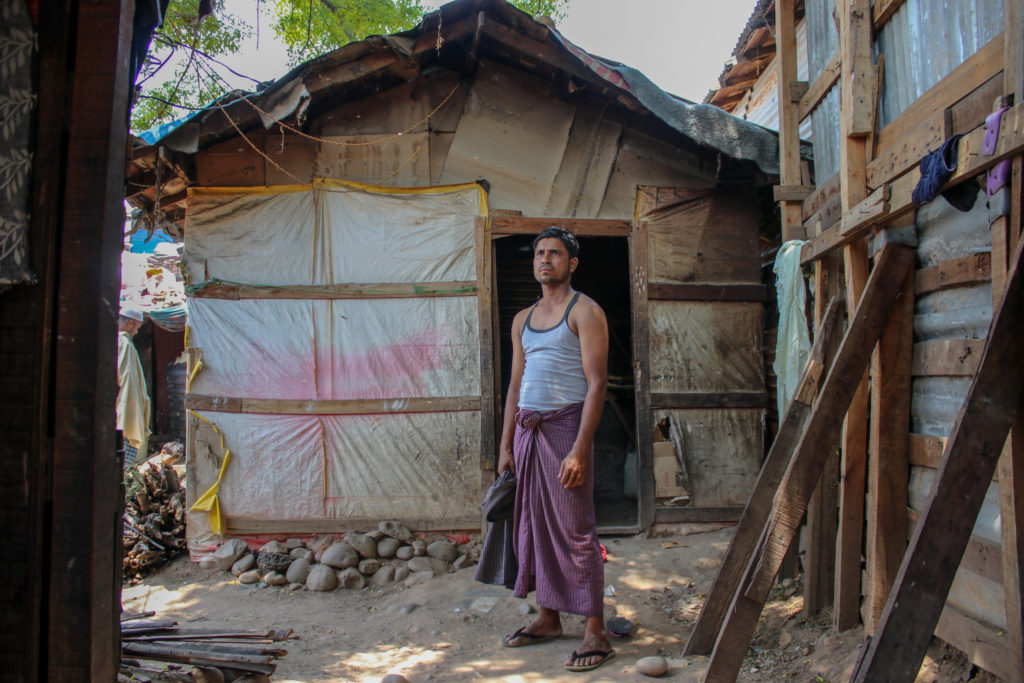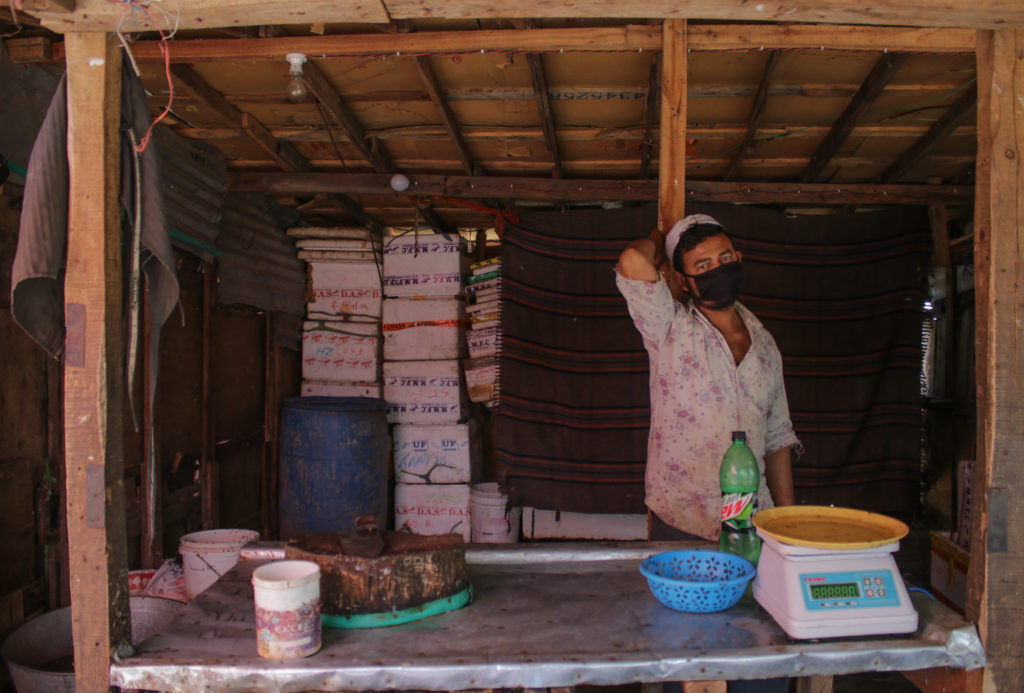In Jammu, the day starts quite early for Mohammad Faisal, a Rohingya refugee. The 24-year-old Faisal lives with his parents and seven siblings in Kariyana Talab, which is one among dozens of slum dwellings inhabited by Rohingya Muslim refugees in Jammu district of Indian administered Jammu and Kashmir.
Every day he wakes up at 5 in the morning and walks up to a community tap installed in the middle of the camp with two 100 liter plastic drums. On some days, he is lucky enough to fill both of them, but most of the time, he has to return empty-handed.
“They (government) ask us to regularly wash our hands to keep the virus away but how without water how is that possible,” he says.
For nearly 1,219 Rohingya families comprising over 5,700 people living in Jammu, the coronavirus pandemic is like a catastrophe waiting at their doors.
From water scarcity, cramped and unhygienic conditions, and dwindling ration stocks to Hindu right-wing hostility, refugees have braved it all, but with each passing day, the hope to keep up the fight grows dim.
“Without basic necessities, we can’t keep this virus at bay for long,” Faisal adds.
Abu Syed, 48 lives in a slum next to Faisal. The sweltering summer heat turns his tin shanty into a hot furnace. For Abu, the only escape from the summer heat is a cold bath, which he last took almost a week ago.
“10 bottle ki zaroorat hai aur hame 3 milti hain (We need at least 10 drums of water and all we get is three),” he says.
But for Syed, water for bathing or drinking is of little concern. He is more worried about hand hygiene as coronavirus cases continue to see an upward trend across India and disputed Jammu and Kashmir.
“A poor laborer like me can’t afford sanitizers, so hand washing is my only option and without water how am I going to do that?” he asks.
India has surpassed two million confirmed coronavirus cases with over 40,000 deaths. In J&K, there has also been a surge in the pandemic, with over 22,396 cases and 417 deaths.
At present, there are more than 40,000 Rohingya refugees living in four Indian states: Haryana, Rajasthan, Delhi, Hyderabad and disputed Jammu and Kashmir. Officially, no COVID positive case has been reported from the Rohingya refugee camps, but fears are running quite high among the community members about a possible outbreak in the near future.
Refugees live in shanties made of tin, bamboo and polythene that lean against each other. Under such cramped conditions, social distancing is almost an impossibility. Most of these slums are without water, electricity, and proper toilets.
In some of the refugee camps, the United Nations High Commission for Refugees (UNHCR) has constructed toilets, where fecal matter is collected by septic trucks every week. But since March 24, when the Indian government led by Hindu nationalist Prime Minister Narendra Modi announced the lockdown to curb the spread of COVID-19, the trucks haven’t come to collect the dump.
It has forced most of the refugee families to use the same toilets, increasing the risk of illness.
52-year-old Abdus Salam lives with his wife and two daughters. He along with 65 other families living in the camp share 8 bathrooms, which were constructed by the UNHCR, some six years back.
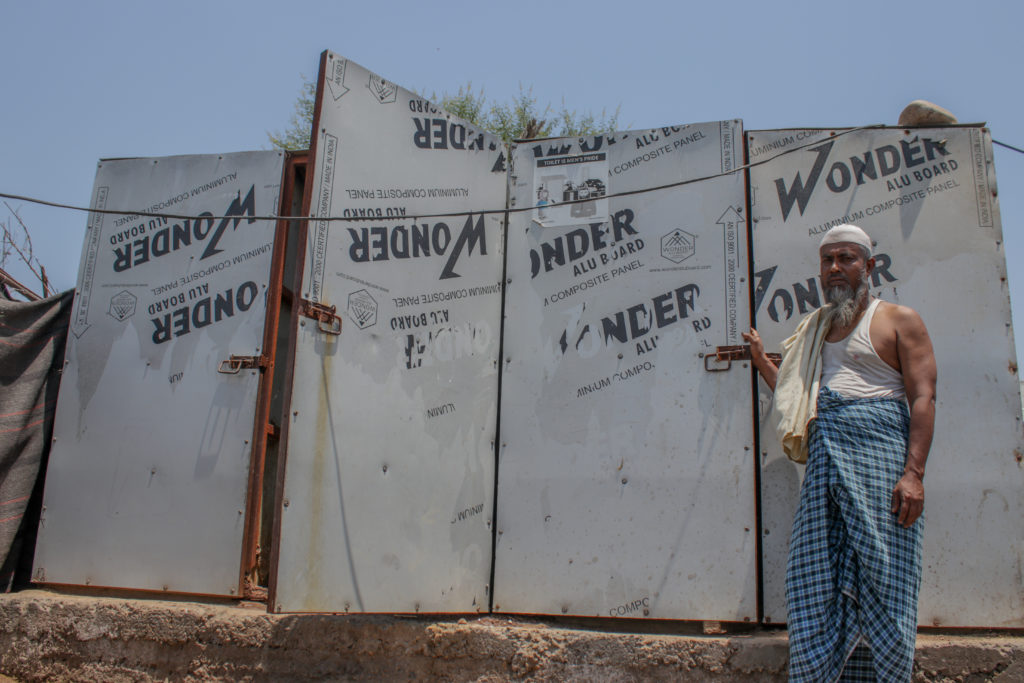
Abdus Salam shows how dilapidated the toilets installed by United Nations High Commission for Refugees (UNHCR) have become.
“Our toilets are full of fecal matter. Using them is our only resort. Otherwise, where would we go?” Salam asks.
He further said that women and children are specifically falling sick after using these toilets.
“If it goes on like this, our whole community might fall sick,” he fears.
Most of the Rohingya refugees either work as daily wage laborers or collect scrap to make a living. The lockdown and restrictions imposed by the regional government on various business activities have forced them out of regular work.
The last time Abu Kalam, 30, worked was on March 23, a day before the Indian government announced a lockdown bringing business activity to a grinding halt. Kalam used to work as a helper at a car-washing center.
Since March, he has been using his savings — which is on the verge of running out — to feed his family of six.
“Each member in my family has cut down on the food they consume so that our ration lasts longer, ” Kalam said.
“Everything is uncertain. No one knows when this will last and when we’ll be able to get back to work,” he adds.
Abdul Shakoor sells fish out of a rented tin shed to make a living. Until March, he was earning enough to pay the rent and feed his wife and two children — a daughter and a son.
Shakoor had planned on saving money this year to expand his fish business, but the coronavirus pandemic and the subsequent lockdown has brought his plans to a halt.
Even though the Indian government has allowed businesses to open, he is still not able to make any profits.
“People don’t have money to spend. I am usually earning 10-20% of what I was earning before,” 37-year-old Shakoor said.
His rent is due for the last four months. Every day the landlord pays him a visit to ask him to pay the rent. He fears that he might have to close down his shop if things don’t improve.
Khadija Khatoon, 54, has a similar story and altogether a similar fate. She used to work at a walnut factory for 8-12 hours a day, cracking shells and removing nuts which fetched her 150 rupees per day. Her husband Nur Islam, a laborer, died some 7 years back due to illness.
Since the lockdown, she is also out of the work. All she has left is a few kilos of grain and a 50 rupees bill.
“A local resident bought me ration a few months back,” she says.
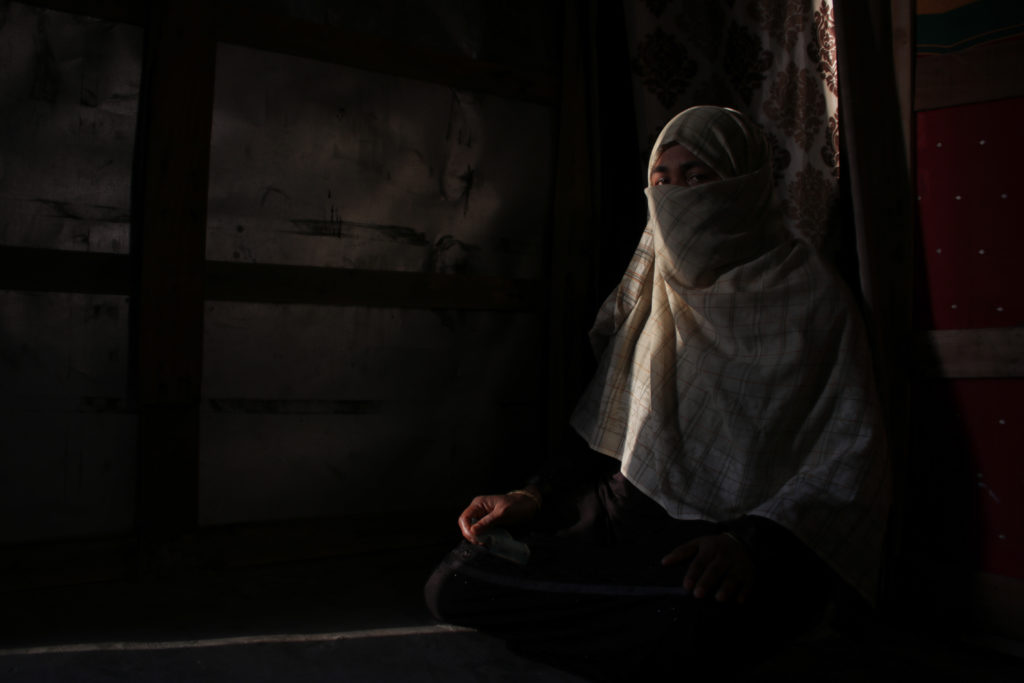
Khadija Khatoon, a walnut factory worker, holds a 50 rupees bill, the only money she has left to buy groceries.
“It’s just a matter of days that I will run out of ration, leaving me with no option but to sleep empty stomach,” she adds.
But what worries Khatoon and other Rohingya refugees most is the continuous hostility and the possibility of physical assault from the far-right vigilante groups that have the backing of India’s ruling Hindu nationalist Bharatiya Janta Party (BJP).
The BJP had been a partner in the coalition government with the regional Peoples Democratic Party (PDP) that ruled the Indian administered Kashmir from 2014-2018. Its party members have used the time in power to amplify their demand for deportation of the Rohingya refugees from Jammu — a Hindu majority district — alleging that they are “illegal immigrants” and a “security threat.”
Mehbooba Mufti, then Chief Minister of disputed Kashmir in 2017, rebuffed the BJP’s allegations and said, “there was no indication of them being radicalized. No Rohingya were found to be involved in militancy-related incidents.”
However, the right-wing leaders have continued their tirade against these refugees even during the coronavirus pandemic. Targeting their occupation of selling vegetables on carts and collecting scrap, senior BJP leader Kavinder Gupta from Jammu in April said that, “there is every likelihood of them spreading the virus to the localities they visit to sell their products.”
Mubashar Ahmed has been living in Jammu for the last eight years and has borne witness to the growing hostility, which he says, has seen a great surge over the last five years.
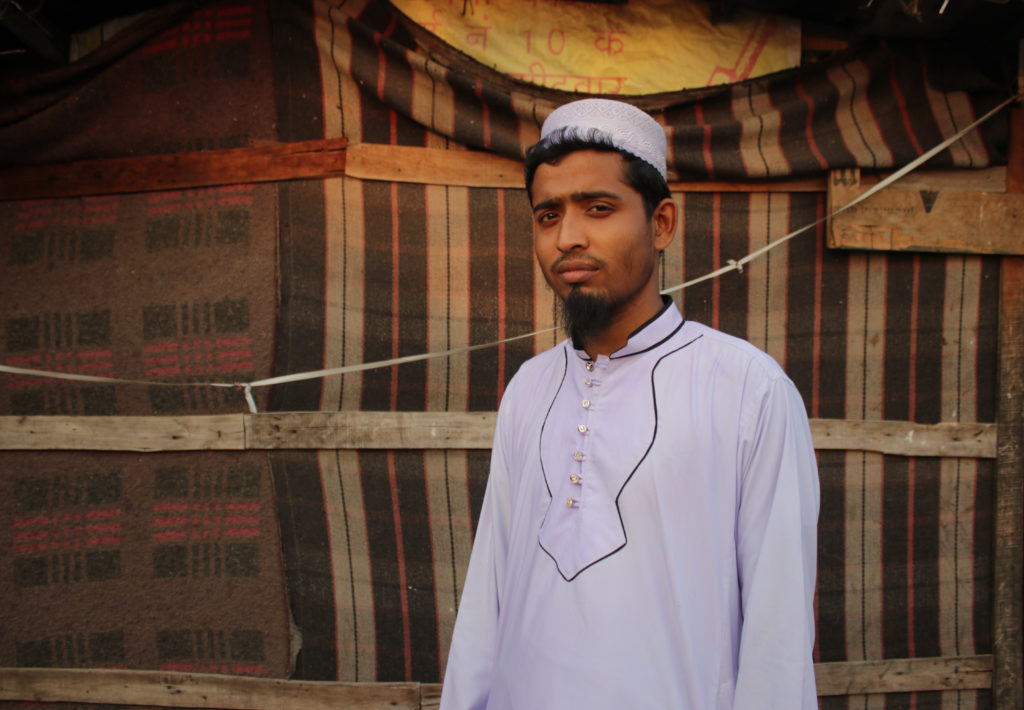
Mubashar Ahmed stands outside his shanty waiting for his friend, on the way to visit an Islamic seminary where he teaches the Quran to refugee kids.
“They call us names; drug suppliers, criminals, thugs, and whatnot. It is only because they have a problem with our faith,” Ahmed says.
When nothing else worked, he says, the right-wing groups began using COVID-19 as a means to paint them as a threat and raise the pitch for their deportation.
Ahmed is afraid that this vilification might dissuade his community members from reporting even if someone has symptoms similar to COVID.
“They just need a reason to call us virus spreaders and kick us out of the country,” he said.
“And if they do it then no country would accept us in the middle of a pandemic,” Ahmed adds.
Raqib Hameed Naik is a Kashmir based multimedia journalist and Director of Operations at community news website, TwoCircles.net. He tweets at @raqib_naik.














